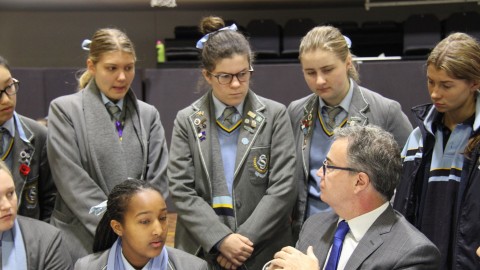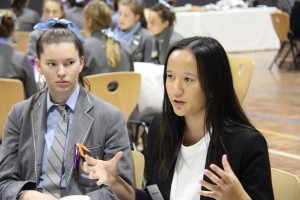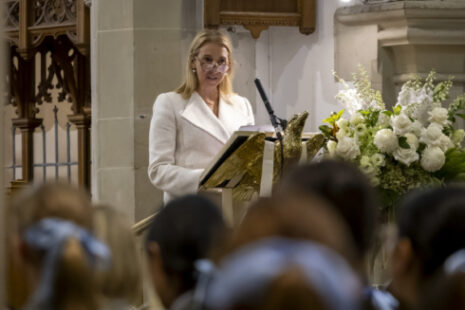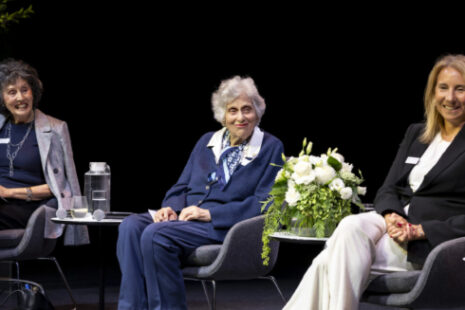Building Career Knowledge

Choosing a career is not an end product itself but rather a focus point in a life journey.
Paul Clithero, well known author and financial analyst, says, “for many people, a job is more than an income, it’s an important part of who we are.”
Choosing a career is not an end product itself but rather a focus point in a life journey of self examination, calculated risk taking and resilience training. We can often spend a lifetime learning to appreciate who we are and applying that knowledge to our private and professional lives. As we discover new parts of ourselves our pathway shifts and new journeys begin.
Conversations about study and occupations are part of the process of building career knowledge. St Catherine’s annual Careers Breakfast, held this morning, provides opportunities for our Years 11 and 12 students to gather career advice and information from others to help shape their own career and study decisions.
St Catherine’s girls are encouraged to make well-informed decisions and be open-minded with the outcome. Obtaining your university degree at first attempt may be appropriate and relevant for some, but making good decisions and remaining open to possibilities is appropriate and relevant for all. ‘Trying on’ study and experimenting with occupations are part of the process of building a career understanding.
In a news article posted in The Sydney Morning Herald on 4 June recent employment data according to the Department of Employment was highlighted. Its recent paper on jobs of the future lists the following occupations; big data analysts, complex decision support analysts, remote controlled vehicle operators, customer experience experts, personalised preventative health helpers and online chaperones – a role preventing online fraud or bullying.
Demographer and social researcher, Mark McCrindle, who runs McCrindle Research, says jobs like these are already being advertised, showing increasing demand. McCrindle identified 10 jobs that were already being advertised:
- Data visualisation expert. Such as a job recently advertised by the NSW Government seeking someone with experience in dissecting and analysing large and multiple, complex sources of raw data and translating this data into engaging and informative presentations and documents. Terms like infographics and data dashboards are now mainstream, said Mr McCrindle. As IBM, in its big data study, stated: “90 per cent of the data in the world today has been created in the last two years alone.”
- Virtual reality engineer. McCrindle explains many employers are looking for knowledge of Oculus, a virtual reality headset. Augmented reality applications have quickly shifted from gaming and entertainment to industries such as real estate where prospective buyers view off the plan units before they are built.
- Cognitive Computing Architect. Mr McCrindle said these specialists bridged the technology and humanity divide. For example, some computer engineering roles require psychology degrees as prerequisites for the roles.
- Cyber-security specialist/SIEM specialist (Security Information and Event Management). He said jobs like one recently advertised at a Sydney bank had grown in importance and urgency as cyber espionage, ransomware and denial of service had spread.
- UAV technicians/ drone pilots. The world of unmanned flight has created many new jobs. “When Harvey Norman is selling as many brands of drones or UAVs [Unmanned Aerial Vehicles] as egg beaters you know it’s a thing,” said McCrindle. A job ad for RAAF Air Combat Officers called for someone to “transition emerging capabilities such as Space, Unmanned Aerial Vehicle and Joint Terminal Attack Control.”
- Classroom Avatar manager/teaching avatar designer. Learning is increasingly taking place out of school premises and hours, and delivered by an avatar, or interactive platform, app or game.
- Operators of driverless vehicles. Cars, buses, planes, etc. Train drivers will manage the trains remotely. Sydney Trains is hiring.
- Medical nanotechnologist and medical engineers. These jobs require expertise in fields such as “tissue engineering and biomaterials, nanotechnology, electromechanical devices, surgical robotics and simulation, computational fluid dynamics, 3D printing.”
- Digital Services Officer. Librarians are morphing into services officers, archivists into digital analyst’s. A recent ad highlights the future – libraries with no books – McCrindle said.
- Aged and Disability Care Agent. As well as a huge demand for community nurses and support workers, new jobs have been created for staff who remotely coordinate these services.
As part of our Careers Breakfast the Years 11 and 12 students host St Catherine’s Old Girls and St Catherine’s parents who provide careers advice and insights into their industries during the event. These conversations and emerging professions were amongst the conversations at the Breakfast this morning. Thank you to Joanne Blankfield (’02), Marina Carroll (’03), Jessie Huynh (’09), Tessa Salmon (’08), Jacinta Halsall (’08), Sara Brearley (’85), Tiffany Leach (’07), Emily Martyn (’09), Amy Freeman (’00) and Susie Nilsson (’86) along with parents Mr Patrick Cody, Mr Scott Mailer, Ms Becky Hyde, Mrs Suzie Gough and Dr Larissa Roeske for attending the Careers Breakfast this morning and supporting our current students as they prepare for their futures.






